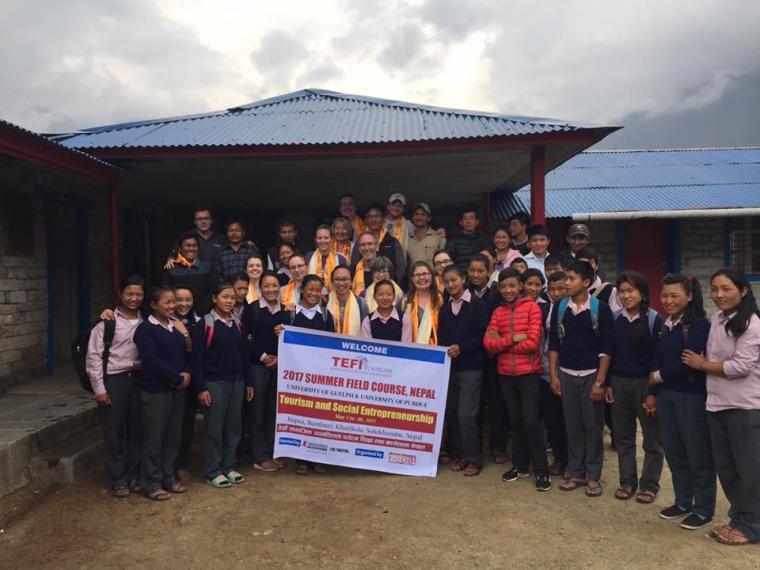Professor and students explore impact of sustainable tourism in Nepal

Hundreds of thousands of international tourists visit the small South Asian country of Nepal each year to experience its many historical sites and take in the Himalayas. It is most widely known as the main entry point to Mount Everest where thrill seekers risk life and limb to climb to the summit. There is no doubt that these tourism dollars are important to Nepal’s economy, but a growing effort is being made to extend Nepalese tourism beyond traditional excursions and expeditions.
Part of that effort, explains School of Hospitality, Food and Tourism Management professor Joan Flaherty, involves fostering “the right kind of tourism” in this case one that is sustainable and involves social enterprises. She recently traveled with five University of Guelph students to mountain villages in Nepal for a two-week field course to learn about the positive effects of its burgeoning sustainable tourism industry. It was a unique opportunity for students to earn a course credit while learning how their decisions as tourists and actions as social entrepreneurs can improve the lives of people in developing countries.
“We looked at sustainable tourism that’s linked to social enterprise,” said Flaherty. “When we visited sites located in the mountain villages of Bupsa, Bumburi and Khari Khola, we witnessed firsthand the power of individuals working together to make a difference.”
The field course illustrated the impact of social enterprise in multiple ways. Adventure Alternative, the independent travel company that facilitates the field course, has a charitable arm called Moving Mountains. The organization works with local people to identify their needs and helps them build and develop certain facilities including schools, medical clinics and community halls. By taking the field course through Adventure Alternative, faculty and students not only witnessed the social enterprise at work and connected with local people, they also generated enough revenue to pay a teacher’s salary for one year and purchase school supplies.
“Learning about these things can be so impactful for all the participants because it involves more than intellectual awareness and understanding. It involves a strong emotional component,” said Flaherty. “You can’t help but feel any number of emotions as you see and experience the villagers’ lives. And you can’t help but reflect on your own life and how it intersects with theirs.”
As the group walked along the mountain paths, they had the opportunity to speak with villagers, immerse themselves in local culture and even stay in the home of one of their Nepalese guides. The students also had a chance to speak with Khari Khola high school students and learn about their education and hopes for future careers.
“The more we truly understand each other, the greater the likelihood of good things arising,” Flaherty added. “In Nepal, students had the chance to be with the Nepalese people: they ate together in the tea lodges, trekked alongside each other on the mountain paths, discussed their career aspirations in the schoolyard, haggled with each other in the marketplace and even danced together in the community hall.”
Flaherty emphasized that these types of interactions are what promote understanding, build stronger countries and subsequently create a more sustainable and ethical tourism industry.
“That’s another lesson for the students: we can make a difference as consumers – simply by choosing wisely where and how we spend our money.”